🇯🇵日本語
🔹祖父の背中──人生を変えた一言
名古屋で創業80年、今年で80周年を迎える老舗とんかつ店「気晴亭」。
三代目・加藤慎二さんが経営を担う今も、店には創業者である祖父の面影が息づいている。
祖父は戦後の混乱期にゼロから店を立ち上げ、誠実さと努力で信頼を築いた人。
口数は少なく、背中で語るタイプだった。
慎二さんが幼い頃から、仕事への厳しさと、人を思う温かさを併せ持った姿を見せてくれた。
フランスでフレンチの道を極め、帰国後は「料理の鉄人」坂井宏行シェフのラロシェルで就職を待ちながら家業を手伝う日々。
そんな中、体調を崩した祖父に静かにこう告げられた。
「店とお墓を頼む」
翌日、祖父は息を引き取った。
その言葉と同時に、坂井シェフからかけられた言葉も胸に残った。
「フレンチでもとんかつでも、お客様に喜んでもらうのは同じだよ。」
二人の言葉は、慎二さんの進む道を決定づけた。
ラロシェルへの夢を手放し、彼は家業へと戻った。
🔹フレンチ修行から三代目へ
国内で修行を積み、フランスへ渡り、以後日本においても
有名ホテルや一流レストランを渡り歩いた日々。
祖父の一言がなければ、そのまま料理人として別の人生を歩んでいたはずだ。
「祖父は僕にとって、経営者としての原点です。
何をするにも“人のためになっているか”を問い続けるのは、祖父の影響ですね。」
🔹古参との確執、そして信頼を積み重ねる日々
戻った先には、長年店を支えてきた古参スタッフたち。
フランス帰りの若手に、最初から歓迎ムードはなかった。
無視、距離感、やりづらさ──。
「姿勢で見せるしかないと思った。
誰よりも早く来て、誰よりも遅くまで働いた。」
少しずつ信頼が生まれ、仕事も任されるようになった。
だが本当の困難は別にあった。
🔹父との確執、20年間無給の現実
父(二代目)は料理をせず、経営もしない人だった。
赤字と借金の山、私的な浪費。
祖母と父から「身内だから給料はなくて当たり前」と言われ、
加藤さんは20年間、無給で働き続けた。
夜はバイトをして生活を繋ぎ、店とスタッフを守るために立ち続けた。
母が虐げられる現実にも向き合い、
くも膜下出血で倒れた母の看病にも毎日通った。
「一期一会。その日が最後かもしれないから。」
🔹職人から経営者へ──心を開くことで変わった景色
長く「職人」として店を守ってきたが、
祖母が高齢で経営から離れたのを機に、経営者としての学びを始めた。
跡取りばかりが集まる会や倫理法人会に参加し、
人脈と学びを得たことで、自分を開示できるようになった。
「スタッフを信じて任せられるようになったら、
彼らも成長し、自分にも時間が生まれた。」
休みを取ることを覚え、店をセミナー会場としても活用。
ご縁が広がり、経営の幅が広がった。
🔹認め合う世界をつくる
加藤さんが世界に伝えたいのは「認め合う」こと。
「押し付けるでも引っ張るでもなく。
認め合えば平和になる。」
その想いは、マクロビメニューの提供や、
多様性を受け入れる姿勢にも現れている。
妥協ではなく進化として相手を受け入れる──
それが彼の定義する「認め合い」だ。
🔹「笑う門には福来る」──フランス修行で見つけた宝物
フランス修行中、言葉も通じず、人種差別や過酷ないじめに耐えた日々。
孤独の中で開いた国語辞典で出会った四字熟語があった。
「笑う門には福来る」
鏡に貼り、毎日無理やり笑った。
最初は気味悪がられたが、4ヶ月後、仲間に迎えられた。
「苦しい時こそ笑う。それで世界が変わった。」
🔹徳を積む──苦しみを超える意味
「苦労している時こそ笑う」──加藤さんはそう話す。
これまでプライベートも仕事も、多くの苦難を経験してきた。
「漢数字を下から並べていくと、“九”は苦しみ。
その上に“十”がある。上から読むと”十九(とく=徳)”になる。
つまり、苦しみを超えることで“徳”が生まれるんです。
ここで言う“徳”は損得の“得”ではなく、人としての“徳”です。」
もちろん善い行いでも徳は積める。
だが、苦しみを乗り越えて得た徳は、人のために使える力になる。
そう気づいたとき、苦しみは嫌うべきものではなくなった。
「喜んで受けようと思えるようになったんです。
乗り越えたことで人に伝えられるなら、
その苦しみは無意味じゃない。
人の徳に繋がってくれたら嬉しいですね。」
🔹笑顔は、生き方そのものに
加藤さんの笑顔は、ただのサービス精神ではない。
涙を飲み込んだ日々、孤独に耐えた時間、守るべき人を守るために選び続けた決断——
そのすべてが積み重なってできた、生き方の証だ。
「笑う門には福来る」という言葉は、今やことわざではなく、
加藤さんそのものを表す旗印になっている。
その旗のもと、彼はこれからも、認め合う輪を世界に広げていく。
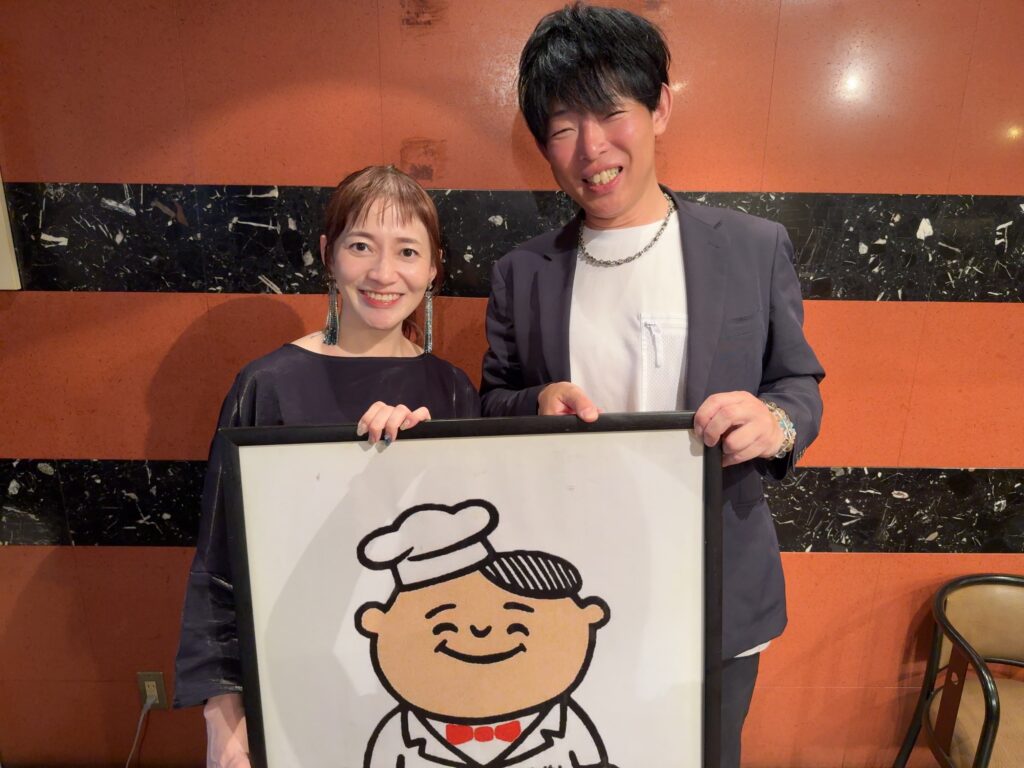
🇺🇸 English
“Laughter Brings Good Fortune” –
Overcoming Hardship to Create a World of Mutual Respect
Interview with Shinji Kato, Third-Generation Owner of Kiharutei, a Long-Established Tonkatsu Restaurant in Nagoya
🔹The Grandfather’s Words – A Turning Point in Life
Founded 80 years ago in Nagoya, Kiharutei celebrates its 80th anniversary this year.
Today, third-generation owner Shinji Kato leads the business, but the presence of his grandfather, the founder, is still felt in the restaurant.
His grandfather built the restaurant from nothing in the difficult postwar years, earning trust through honesty and hard work.
He was a man of few words, speaking more through his actions. From a young age, Shinji saw in him both strict discipline at work and deep kindness toward people.
After years of training in France, Shinji returned to Japan and was waiting to start work at La Rochelle, the restaurant of celebrity chef Hiroyuki Sakai from Iron Chef, while helping at the family shop.
One day, his ailing grandfather quietly said:
“Take care of the shop and the family grave.”
The very next day, his grandfather passed away.
Around the same time, Chef Sakai told him:
“Whether it’s French cuisine or tonkatsu, it’s the same – making customers happy.”
Those two messages decided Shinji’s path.
He gave up his dream of working at La Rochelle and returned to run the family business.
🔹From French Cuisine to Tonkatsu
Before taking over the shop, Shinji trained at top hotels and fine restaurants in Japan and France.
If not for his grandfather’s words, he would have continued as a chef in a completely different world.
“My grandfather is my starting point as a business owner.
Whatever I do, I ask myself – is this for the good of others? That comes from him.”
🔹Conflict with Senior Staff – Earning Trust Over Time
When he returned, the shop was run by long-time senior staff.
A young man fresh from France was not welcomed warmly.
There was distance, silence, and an uneasy atmosphere.
“I knew I had to show my commitment through my actions.
I came earlier and left later than anyone else.”
Gradually, trust grew, and responsibilities were shared.
But a bigger challenge lay ahead.
🔹Conflict with His Father – 20 Years Without Pay
His father, the second-generation owner, neither cooked nor managed the business.
The shop was deep in debt and running at a loss, while money was spent for personal use.
Both his grandmother and father told Shinji, “You’re family, so you don’t need a salary.”
For 20 years, he worked without pay, doing night jobs to cover his living expenses while protecting the shop and its staff.
At the same time, he stood by his mother, who suffered mistreatment, and visited her every day after she collapsed from a brain hemorrhage.
“Every meeting could be the last. I wanted to value each one.”
🔹From Craftsman to Business Owner – The Power of Opening Up
For many years, Shinji simply protected the shop.
When his grandmother stepped back from management, he began learning how to be a business leader.
By joining groups of family business successors and the local Ethics Corporation Association, he built connections and learned to share more about himself.
“When I started trusting my staff and giving them responsibility,
they grew – and I gained more time for myself.”
He learned to take breaks, and even opened the shop as a seminar venue, expanding both his network and the scope of his business.
🔹Creating a World of Mutual Respect
Shinji’s message to the world is simple: “Respect each other.”
“Neither pushing nor pulling.
If we respect each other, there will be peace.”
This spirit shows in his introduction of macrobiotic menu options and his openness to diversity.
For him, accepting others is not compromise – it is growth.
🔹“Laughter Brings Good Fortune” – A Treasure Found in France
During his training in France, he faced language barriers, discrimination, and harsh bullying.
In his loneliness, he opened a Japanese dictionary and found a four-character saying:
笑う門には福来る – Laughter brings good fortune.
He stuck it on his mirror and forced himself to smile every day.
At first, people found it strange. But after four months, he was accepted into the group.
“When times are hard, smile. That’s how my world changed.”
🔹Accumulating Virtue – The Meaning of Overcoming Hardship
“When you’re struggling, that’s the time to smile,” Shinji says.
Both in business and in life, he has faced many hardships.
“In Japanese kanji, the number nine (九) means suffering.
Put the number ten (十) above it, and together they form the character for virtue (徳).
This ‘virtue’ is not about personal gain – it’s about human goodness.”
Good deeds can also build virtue, but virtue gained by overcoming suffering is a strength you can use for others.
“Once I realized that, I stopped hating hardship.
If enduring it means I can help someone else,
I’ll accept it gladly.
If I can share my story and it becomes someone else’s virtue,
then my suffering was not in vain.”
🔹A Smile as a Way of Life
Shinji’s smile is not just customer service.
It is the result of days swallowing tears, enduring loneliness, and making choices to protect those who mattered.
Today, “Laughter brings good fortune” is no longer just a proverb – it is a banner that represents who he is.
Under that banner, he continues to spread a circle of mutual respect to the world.
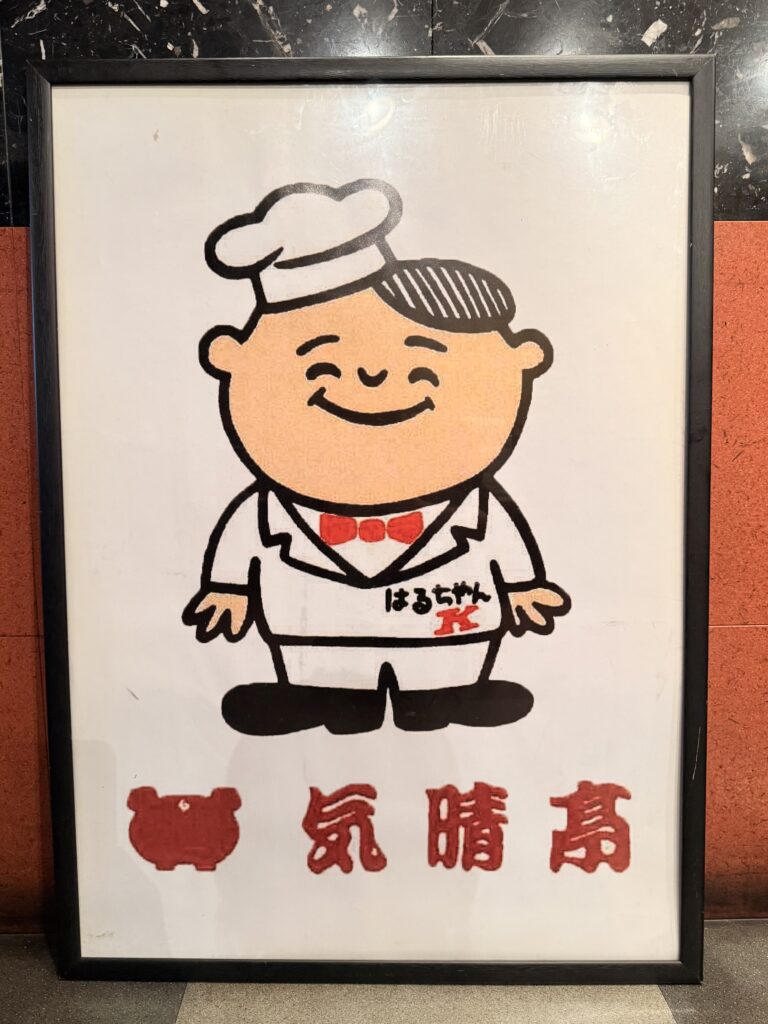
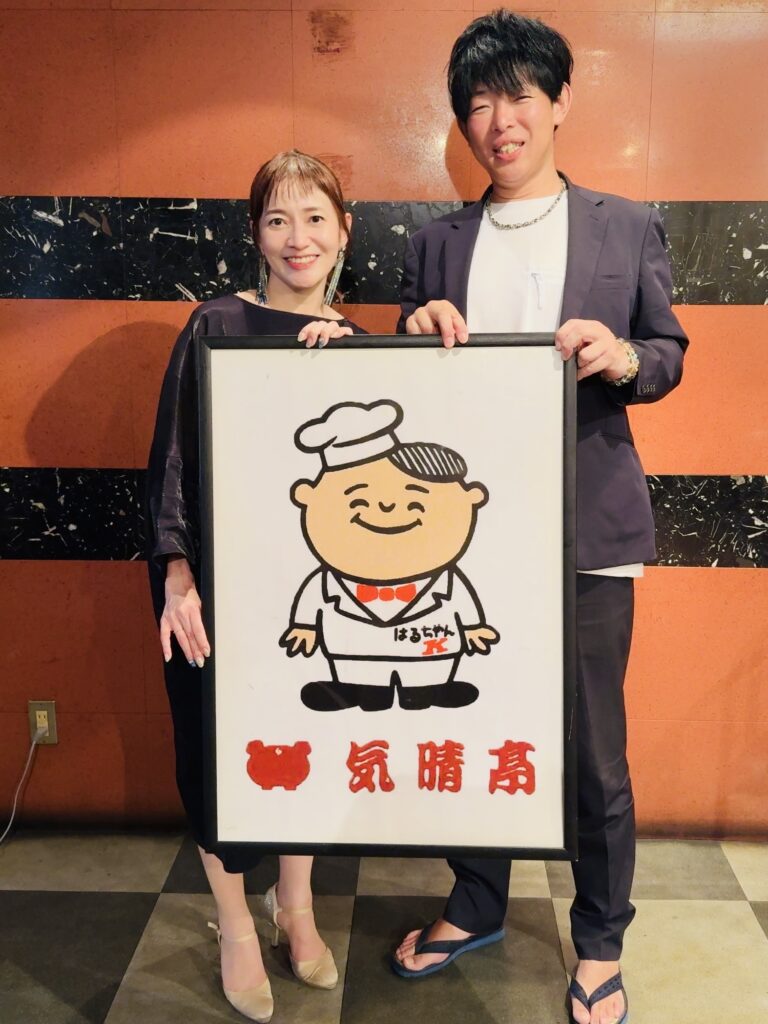
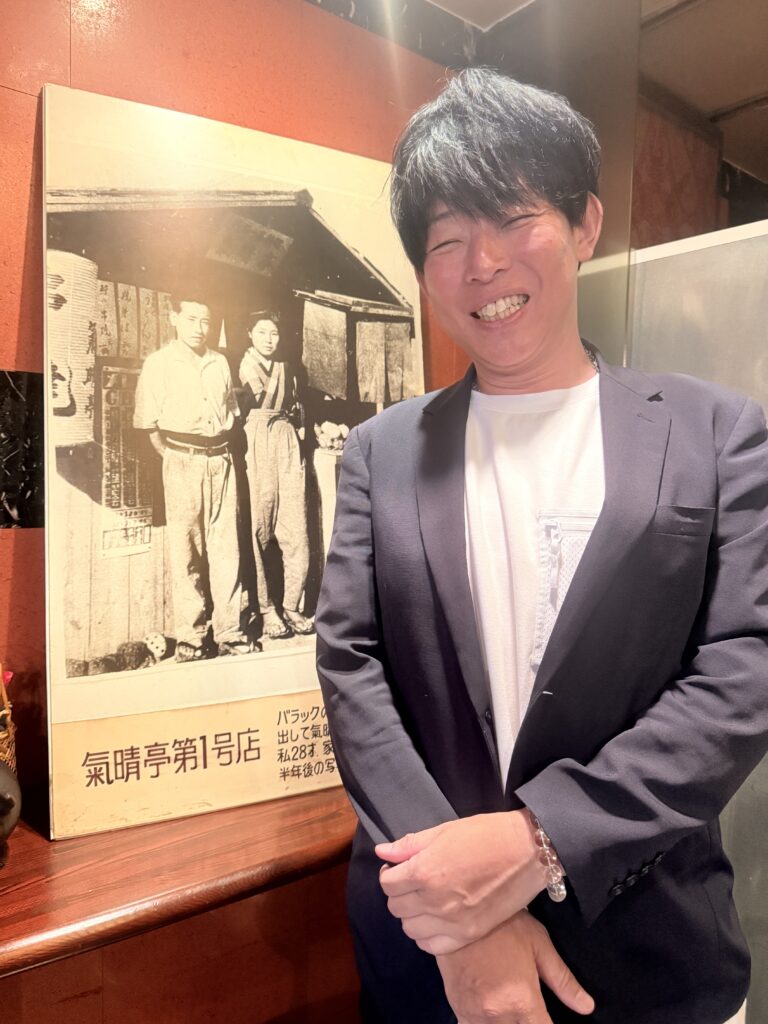
【PROFILE】
加藤 慎二(かとう・しんじ)
老舗とんかつ店「気晴亭」三代目。
フレンチの修行を経て家業を継ぎ、味噌カツをはじめとした名古屋の味を守る。
「認め合う世界」を信条に、経営と料理の両輪で人と地域をつなぐ。
Shinji Kato
Third-generation owner of Kiharutei, a long-established tonkatsu restaurant in Nagoya.
After training in French cuisine, he returned to carry on the family business, preserving the taste of Nagoya such as miso katsu.
With the belief in “a world of mutual respect,” he connects people and the community through both management and cuisine.
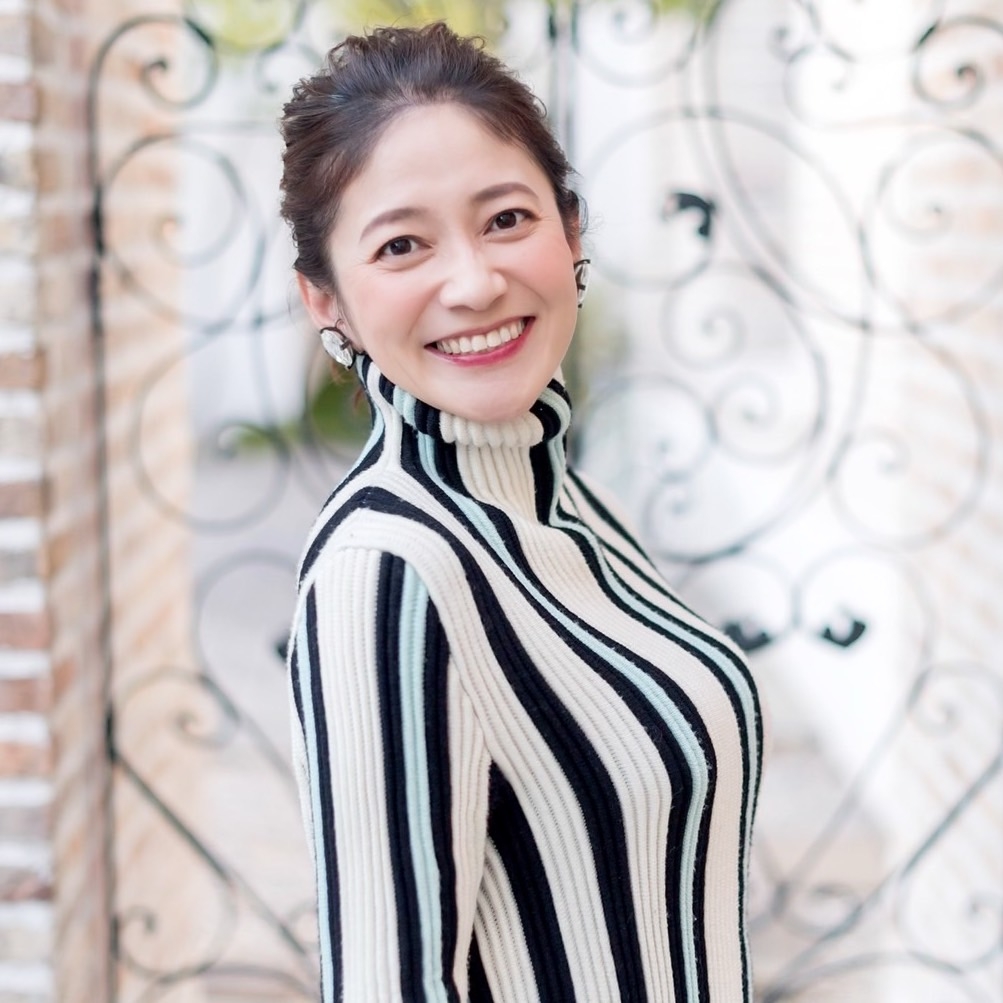
【PROFILE】
真綺(Maki)
語りの芸術家/インタビュアー/コミュニケーション・スペシャリスト
8年間“しつもん力”を教え、日本語と英語の間で人の想いを橋渡ししてきた。
これまで国内外で、経営者、アーティスト、国際的イベントの登壇者など延べ数千人と対話。
世界的な授賞式や王室叙任式のスピーチ・通訳も担当し、言葉と存在感の両面から人の魅力を引き出す。
Maki
Word Painter / Interviewer / Communication Specialist
For eight years, Maki has taught the art of asking powerful questions, bridging stories between Japanese and English.
She has engaged in thousands of conversations with business leaders, artists, and speakers at international events, both in Japan and abroad.
Her work includes speeches and interpretation for global award ceremonies and royal investitures, capturing and conveying the essence of a person through both words and presence.
経営者の存在感を、言葉とストーリーに刻む。
真綺による日英インタビューにご興味のある企業様はこちらからお問い合わせください。








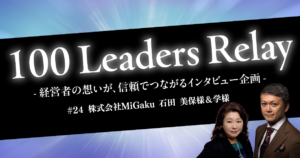

コメント